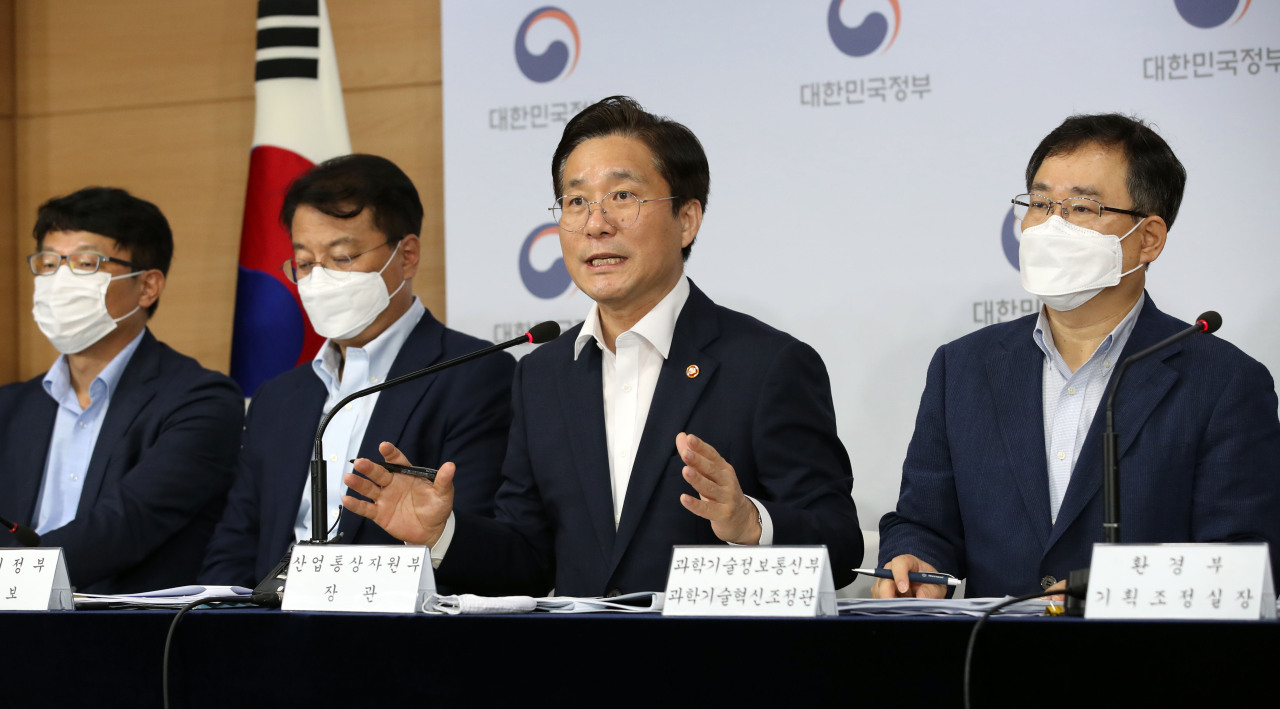 |
Industry Minister Sung Yun-mo speaks during a briefing held at the government complex in Seoul, Wednesday (Yonhap) |
South Korea will inject over 5 trillion won ($4.1 billion) in the materials, parts and equipment industries to ensure stable supplies for the nation’s key exports, officials said Thursday.
Industry Minister Sung Yun-mo held a briefing at SK hynix’s headquarters in Icheon, in the presence of President Moon Jae-in. He introduced details of the government’s midterm plans designed to foster local manufacturers and researchers in the industries -- which depend highly on imports.
Sung stressed the importance of incubating homegrown technologies and products amid the intensifying trade war between the US and China and the growing global protectionism.
The latest plan is an extended version of the short-term plan released last year after Japan imposed restrictions on exports to Korea, particularly on three materials critical for the production of semiconductors and displays.
Korea is still heavily dependent on imported parts and materials. The nation’s trade deficit with Japan in 2019, for instance, reached $19.2 billion. Of the total, imports of materials, parts and equipment accounted for 95 percent, reaching $18.2 billion.
Under the latest plan, Korea plans to ensure enough supplies of 338 key items in relation to Japan’s export curbs, an increase from 100 items designated since the restrictions began in July last year.
To accelerate development of homegrown technologies for key industrial parts and materials and reduce the nation’s dependence on imports, the nation will inject funds until 2022.
Of the total amount, 2 trillion won will be allocated for the nation’s three major industries next year, including system semiconductor, biotech and future mobility sectors, the ministry said.
The government plans to provide tax benefits and secure 110 billion won worth venture capital funds to support small and medium-sized firms developing future technologies. Financial aid of 150 billion won will be provided to local firms to commercialize their parts and materials products.
The government also pledged to relax restrictions for new projects in the near future.
It aims to see around 30 local parts, materials and equipment makers listed on Forbes Global 2000 list by 2030.
The government will separately invest 1.5 trillion won over the next five years to create industrial clusters that connect the major players with SMEs. It will also encourage foreign companies to join research and development projects here, increasing the participation rate from 3 percent to 10 percent.
SK hynix, for instance, is now working on a semiconductor cluster project in Yongin, Gyeonggi Province. The chipmaker plans to construct an industrial complex comprising four semiconductor fabrication plants with 120 trillion won worth investment. Around 50 equipment, parts and material makers are expected to join the cluster spanning across 4.5 million square meters.
By Shim Woo-hyun (
ws@heraldcorp.com)








